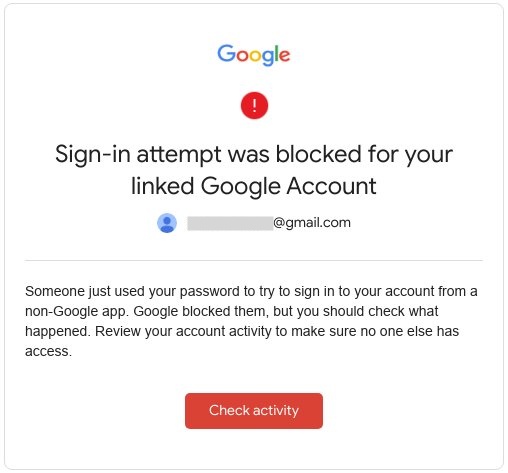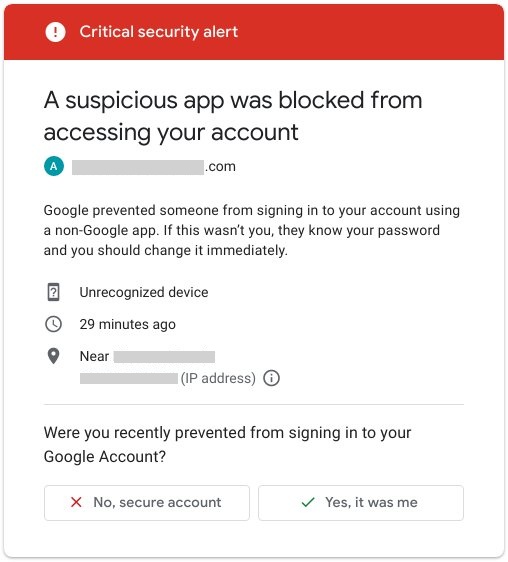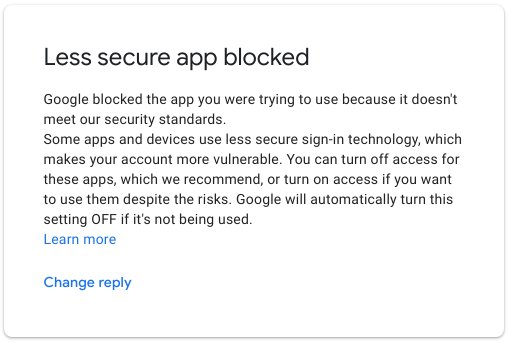gmail-send
Minimalistic module to send emails using GMail (supports Promise)
Basically it's a wrapper around nodemailer package to simplify its usage for GMail accounts even more.
If you have different needs regarding the functionality, please add a feature request.
Install
npm install --save gmail-sendPrerequisites
Preparation step - Configure your GMail account
In order to send emails using GMail you need your account to be configured properly.
Its configuration depends on whether are you using two-step authentication or not.
Case 1: Your account is NOT configured to use two-step verification
In this case it is required to allow access to an account for "less secure apps".
Detailed step-by-step actions with sreenshots are described here
Case 2: Your account is configured to use two-step verification
Configure application-specific passwords for your GMail account (if you are not using two-step verification, just skip this step and use same password you are using to login to GMail)
To be able send emails using GMail from any application (including Node.js) you need to generate application-specific password to access GMail: My Account -> Sign-in & security -> Signing in to Google -> App passwords
Select 'Other (Custom name)' in 'Select app'/'Select device' drop-downs, enter descriptive name for your application and device and press 'GENERATE'. Copy provided password.
Quick start
- Initialization: require the module and set defaults
const send = require('gmail-send')({
user: 'user@gmail.com',
pass: 'abcdefghijklmnop',
to: 'user@gmail.com',
subject: 'test subject',
});Now use it (callback way):
send({
text: 'gmail-send example 1',
}, (error, result, fullResult) => {
if (error) console.error(error);
console.log(result);
})If the callback is not provided, send function will return Promise.
Usage
1. Initializaton
const send = require('gmail-send')(options);-
options- mandatory - an object with following basic properties:-
user- mandatory -
pass- mandatory -
to- mandatory - address asstringor array ofstringaddresses you also may set array of recipients: [ 'user1@gmail.com', 'user2@gmail.com ] -
from- optional - by default equals touser -
replyTo- optional - by defaultundefined -
subject- optional - subject line -
text- optional - Plain text content -
html- optional - HTML content -
files- optional - array of files to attach- if particular filename in array is of
stringtype, it is the filepath to attach - if it is an object
{ path, filename }then:-
path- is the filepath to attach -
filename- this value will be set as attachment filename in email ],
-
- if particular filename in array is of
-
You may set also any option provided by nodemailer and it will be passed further, for example:
- bcc - optional - this option is not defined in
gmail-sendand will be passed tonodemailerunchanged
2.1. Usage with callback
send(options, callback);-
options- optional -
callback- optionalcallbacktakes 3 parameters:- error - error object or
null - result - string response returned by Nodemailer (same as
full.response) - full - full result returned by Nodemailer
- error - error object or
2.2. Usage with Promise
If callback is not provided, send will return Promise which
- resolves into
{ result, full }object with properties same as in callback - or rejects with error object.
2.2.1 then/catch
send(options)
.then(({ result, full }) => console.log(result))
.catch((error) => console.error('ERROR', error))
;
2.2.2. async/await
try {
const {result,full} = await send(options);
console.log(result);
} catch(error) {
console.error('ERROR', error);
}More examples
Example 1 - Callback way
console.log('* [example 1]');
// Require'ing module and setting default options
const send = require('gmail-send')({
//const send = require('../index.js')({
user: 'user@gmail.com',
// user: credentials.user, // Your GMail account used to send emails
pass: 'abcdefghijklmnop',
// pass: credentials.pass, // Application-specific password
to: 'user@gmail.com',
// to: credentials.user, // Send to yourself
// // you also may set array of recipients:
// // [ 'user1@gmail.com', 'user2@gmail.com' ]
// from: credentials.user, // from: by default equals to user
// replyTo: credentials.user, // replyTo: by default `undefined`
// bcc: 'some-user@mail.com', // almost any option of `nodemailer` will be passed to it
// // (but no any processing will be done on them)
subject: 'test subject',
text: 'gmail-send example 1', // Plain text
//html: '<b>html text</b>' // HTML
// files: [ filepath ], // Set filenames to attach (if you need to set attachment filename in email, see example below
});
const filepath = './demo-attachment.txt'; // File to attach
console.log('* [example 1.1] sending test email');
// Override any default option and send email
send({ // Overriding default parameters
subject: 'attached '+filepath, // Override value set as default
files: [ filepath ],
}, function (err, res, full) {
if (err) return console.log('* [example 1.1] send() callback returned: err:', err);
console.log('* [example 1.1] send() callback returned: res:', res);
// uncomment to see full response from Nodemailer:
// console.log('* [example 1.2] send() callback returned: full:', full);
});
//
// // String result:
//
// * [example 1.1] sending test email
//
//
// // Full response (if uncommented):
//
// * [example 1.21] send() callback returned: err: null ; res: 250 2.0.0 OK 1234567890 1234567890abcde.67 - gsmtp ; full: {
// 1234567890 1234567890abcde.67 - gsmtp ; full: {
// accepted: [ 'user@gmail.com' ],
// rejected: [],
// envelopeTime: 252,
// messageTime: 1386,
// messageSize: 678,
// response: '250 2.0.0 OK 1234567890 1234567890abcde.67 - gsmtp',
// envelope: { from: 'user@gmail.com', to: [ 'user@gmail.com' ] },
// messageId: '<12345678-1234-1234-1234-12345678901@gmail.com>'
// }
console.log('* [example 1.2] sending test email');
// Set additional file properties
send({ // Overriding default parameters
subject: 'attached '+filepath, // Override value set as default
files: [ // Array of files to attach
{
path: filepath,
filename: 'filename-can-be-changed.txt' // You can override filename in the attachment if needed
}
],
}, function (err, res, full) {
if (err) return console.log('* [example 1.2] send() callback returned: err:', err);
console.log('* [example 1.2] send() callback returned: res:', res);
// uncomment to see full response from Nodemailer:
// console.log('* [example 1.2] send() callback returned: full:', full);
});
//
// // String result:
//
// * [example 1.2] sending test email
//
//
// // Full response (if uncommented):
//`
// * [example 1.2] send() callback returned: err: null ; res: 250 2.0.0 OK 1234567890 1234567890abcde.67 - gsmtp ; full: {
// accepted: [ 'user@gmail.com' ],
// rejected: [],
// envelopeTime: 239,
// messageTime: 885,
// messageSize: 694,
// response: '250 2.0.0 OK 1234567890 1234567890abcde.67 - gsmtp',
// envelope: { from: 'user@gmail.com', to: [ 'user@gmail.com' ] },
// messageId: '<12345678-1234-1234-1234-12345678901@gmail.com>'
// }Example 2
You may also set all needed parameters at once and immediately send:
console.log('* [example2] sending test email without checking the result');
//var send = require('gmail-send')({
require('../index.js')({
user: credentials.user, // Your GMail account used to send emails
pass: credentials.pass, // Application-specific password
to: credentials.user, // Send to yourself
subject: 'ping',
text: 'gmail-send example 3', // Plain text
})(()=>{}); // Send email without any check
//
// Either callback function MUST be provided
// or Promise rejection must be handled (see below)
//
// * [example2] sending test email without checking the result
//You can find these working examples in ./demo/demo.js.
You'll need to set your GMail user/pass in credential.json.example and rename it to credential.json in order to run the example). sWhen credentials are set, run the application using node demo/demo.js or node demo.js depending on your current directory.
Example 3 - Promise way
If callback function is not provided, send function returns Promise.
Instead of plain string response, Promise resolves to following object:
{
result: "string result", // same as full.response
full: { ... }, // full response from Nodemailer
}//
// Promise Example 1
// =================
console.log('* [promise-example-1] configuring');
// Require'ing module and setting default options
//var send = require('gmail-send')({
var send = require('../index.js')({
user: credentials.user,
pass: credentials.pass,
to: credentials.user,
subject: 'test subject',
text: 'gmail-send promise examples',
});
// Send email
console.log('* [promise-example-1] sending');
const result = send() // Using default parameters
.then((res) => {
console.log('* [promise-example-1] then: res.result:', res.result);
// full response from Nodemailer:
// console.log('* [promise-example-1] then: res.full:', res.full);
})
.catch((error) => {
console.log('ERROR:', error);
console.log('* [promise-example-1] catch: error:', error);
})
;
console.log('* [promise-example-2] sending');
const asyncAwaitSend = async() => {
try {
const res = await send(); // Using default parameters
console.log('* [promise-example-2] res.result:', res.result);
// uncomment to see full response from Nodemailer:
// console.log('* [promise-example-2] res.full:', res.full);
} catch (e) {
console.error('* [promise-example-2] ERROR:', e);
}
};
asyncAwaitSend();Troubleshooting
1. Critical security alert message to your linked account
If you receive message with the subject "Critical security alert for your linked Google Account
" to your email account linked to the one you are trying to use:

You may click 'Check activity', check information to ensure it was yours attepmt and confirm it by clicking on 'Yes, it was me' button.
But if you are not using two-step verification even now you still need to enable access for less-secure app (see preparation steps above).
2. "Invalid login" error when not using two-steps verification
If you receive following error response when trying to send email:
submitOrder: assistant email: user@gmail.com
* gmailSend: ERROR: Error: Invalid login: 535-5.7.8 Username and Password not accepted. Learn more at
535 5.7.8 https://support.google.com/mail/?p=BadCredentials v15sm6024371lfd.53 - gsmtp
...
code: 'EAUTH',
response: '535-5.7.8 Username and Password not accepted. Learn more at\n' +
'535 5.7.8 https://support.google.com/mail/?p=BadCredentials v15sm6024371lfd.53 - gsmtp',
responseCode: 535,
command: 'AUTH PLAIN'
}
In this case (as suggested by the link provided in this response) you need to:
- check your username/password
- ensure you allowed less secure application access if you are not using two-steps verification.
Credits
Links to package pages:
github.com npmjs.com travis-ci.org coveralls.io inch-ci.org
License
MIT

